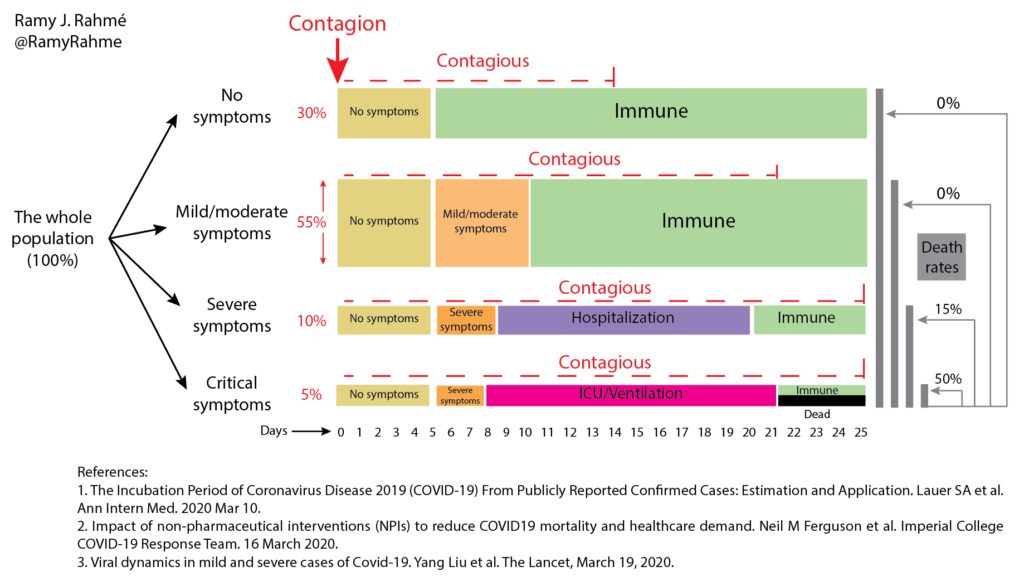Symptoms and What To Do

Symptoms
Have you felt off, taken your temperature a few times a day, washed your hands for the billionth time, and literally sensed the SARS-CoV-2 virus, this mutant invader, slowly crawling down your throat? Then, yes, you probably have what I have. I’m a self-professed, non-recovered hypochondriac and germophobe! Lord help us during this COVID-19 crisis.
With all kidding aside, I thought today I would focus on the symptoms of COVID-19 and most importantly what to do if you feel sick.
One disclaimer: As time goes on, some of my opinions and recommendations may change as more information comes in. Modern medicine is evidence-based—meaning, recommendations made to the public are studied and restudied, hopefully by well-designed research that involves thousands of subjects over considerable time. As everyone has determined, we all are flying by the seats of our pants on this one. Some studies I see quoted, involve ten or less patients, and it’s really hard to base standard-of-care on that small number of statistics. But it’s the best science we have at this point, and we have to start somewhere.
Many of you have asked about the use of ibuprofen during COVID-19. The current recommendations come from a small study and other antidotal experiences in France where patients seemed to get worse on anti-inflammatories. It’s so hard to know, but for now, I would not recommend taking ibuprofen for COVID-19 fever or body aches.
So, what exactly are my physician colleges around the world saying about the symptoms and what are they seeing in the Emergency Departments:

Symptoms start 2-11 days after exposure (5 days average). They include:
Fever
Headache
Dry cough
Myalgias (back pain or muscle aches)
Nausea without vomiting
Abdominal discomfort with some diarrhea
Loss of smell
Anorexia (not hungry)
Fatigue
“Pink eye” or “Red eye”
5th day of symptoms
Increased shortness of breath
10th day of symptoms
This appears to be the turning point for most of the patients for good or bad.
It’s clear in reports from physicians on the front line, the virus can attack both the lungs and the heart, and many patients are presenting with cardiac involvement…new onset of congestive heart failure, arrhythmias, and myocarditis.
Statistics vary from state-to-state, but most reports show that approximately 80% of patients have mild-moderate symptoms and 20% severe (15% require hospitalization, and 5% are critical).
CARE:
So, let’s talk about what happens if you get any of the symptoms above. These come from most ED physicians I have talked to or communicated with.
1. First, stay calm. Very likely you will do just fine. You might feel terrible for a few days, but most of us will recover fully!
2. Unless you are in medical distress…DO NOT go to the Emergency Department or doctor…but rather call your doctor and check in with them. Because of the lack of testing supplies, they will probably not offer to do that. Typically right now, only those admitted to the hospital are being tested.
3. Keep watch of your temperature and record it. Take Tylenol to bring your fever down.
4. See Tip of the Day…monitor your O2 saturation CAREFULLY. This is by far the best indicator of how you’re doing. Often measuring your O2 Sat. reassures you that you need not go to the hospital. Your doctor will want to know this information (this may vary from place to place), but if you are keeping your O2 Sat about 92-93, you do not need to go to the hospital.
5. You are contagious and should stay isolated from EVERYONE.
6. Do all the things your mama taught you to do to take care of yourself when you’re sick, get lots and lots of rest, plenty of fluids, and warm tea or my favorite…warm Emergen-C. Warm salt-water gargles are thought to help decrease the viral load in your throat and mouth.
Takeaways:
1) Know what the symptoms of COVID-19 are. Yes…you can still get sick with other things right now, but by far the vast majority of sickness going around is from SARS-CoV-2. One ED doc said, “It’s like there’s a new sheriff in town and kicked all the other diseases out.”
2) If you are sick assume you have it until proven otherwise and self-isolate.
3) You probably won’t be tested unless you require hospitalization. (I will do an entire post on testing soon)
Practical Tip of the Day:
If you can, buy a simple finger, pulse oximeter or check with your friends to see who has one to borrow (they can always drop it off on your porch…NO contact!). This is by far the best way to monitor how you’re doing, and it will tell you exactly when and if you need to go to the hospital.
As a funny…I was watching the TODAY show this morning and Andy Cohen talked about his “ox-i-meter”. Since we are all going to become very acquainted with this term, the pronunciation is actually: /äkˈsimidər/
Stay safe and healthy…With love, Timothy




As always good info
Thanks Sandy…You mentioned about getting added to my newsletter.
If you would do me a favor…go to my website: authortimothybrowne.com
At the bottom is a small icon…next to the Facebook and Twitter icons…it loooks like a tiny open book.
If you click on that, it will take you to a sign-up screen.
Please let me know if it works okay. Because of regulation, it’s best to have the individual person sign up.
How do you monitor your own O2 saturation?
Hey Yvonne…Yes…and I certainly if would be faithfully if I was sick!